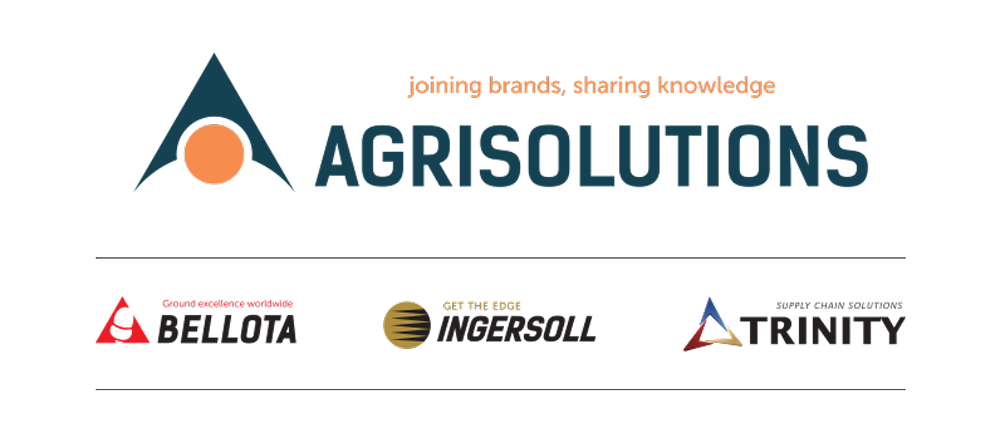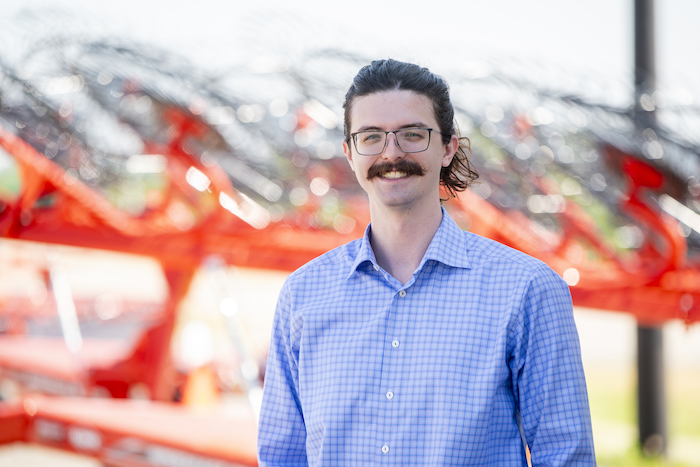In this episode of On The Record, we examine the preliminary results of the 2023 Ag Equipment Intelligence Big Dealer report. In the Technology Corner, Noah Newman takes a look at FarmWave's harvest loss technology. Also in this episode: European investment comes to a Manitoba dealership, the majors' 2022 investments and acquisitions and why John Deere and Case IH are going for integrated solutions in their tech stacks.
This episode of On The Record is brought to you by Agrisolutions.
Improve performance and durability with a wide range of premium tillage parts and extended life solutions, with Agrisolutions. As the market leader in wearable parts, components, accessories and solutions for tillage, seeding, planting and fertilizing, Agrisolutions is proud of their purpose - to build and feed the world. To learn more about Agrisolutions and their globally recognized brands, such as Bellota, Ingersoll Tillage and Trinity Logistics, visit Agrisolutionscorp.com.
TRANSCRIPT
Jump to a section or scroll for the full episode...
- 2023 Sees Fewer Big Dealers, But More Big Dealer Locations
- Dealers on the Move
- Farmwave’s Autonomous Harvest Loss Technology Pays off for Corn, Soybean & Cotton Farmers
- European Investment Comes to Manitoba Dealer
- The Power of Integrated Technology
- 2022 Mainline Investments & Acquisitions
- DataPoints: Improving Lithium Battery Tech
2023 Sees Fewer Big Dealers, But More Big Dealer Locations
Based on preliminary results of Ag Equipment Intelligence’s 2023 Big Dealer Report, dealer consolidation has not slowed down in the last year.
Rising interest rates have become a leading reason for growers to not buy farm equipment, according to the latest update to Purdue’s Ag Economy Barometer.

After rising to a record high of 214 big dealers in 2022, consolidation has dropped that number to 206 in 2023. However, the total number of stores owned by big dealers increased from 2,589 to 2,632 this year, an increase of about 1%.

Deere once again has the highest number of big dealers at 86, but that is down from 90 in 2022. AGCO’s number of big dealers rose to 24 this year from 23 last year, the only major to see an increase. After rising to 48 last year, the number of Case IH dealers fell to 42 this year, and New Holland’s big dealers also declined to 31. Kubota’s number of big dealers declined by 3 to 30. “Other” big dealers, which includes company-owned and shortline-only dealerships, rose to 21 vs. 19 in 2022. Big dealers now own 39% of total ag stores in North America vs. 37% in 2022.

Deere big dealers now own a total of 1,499 ag equipment locations, up 2.1% from 1,468 in last year’s report. Case IH big dealers operate 455 total ag stores, down from 457 in 2022. AGCO’s big dealers’ total ag stores were down to 221 from 225 in 2022, the second year of decline.
New Holland big dealers saw a 3.8% increase in total ag stores with 276 in this year’s report vs. 266 in 2022. Kubota big dealers saw the largest growth in total ag stores going from 225 in 2022 to 248 in 2022, an increase of 10%. “Other” big dealers operate 199 ag locations, up from 186.
The full 2023 Big Dealer Report, which includes the full list of big dealers as well as an analysis of merger and acquisition activity over the past year, will be available later this month.
Dealers on the Move
This week’s Dealers on the Move are Agri-Service, Nelson Tractor Co., AgWest and H&R Agri-Power.
Agri-Service, an 8-location AGCO dealer serving Idaho, Washington, Oregon and Wyoming, announced April 10 it had entered into agreements to acquire the operating assets of Idaho and Washington based AGCO dealerships Diesel & Machine and Blue Mountain Agri-Support.
Kubota and New Holland dealer Nelson Tractor Co. recently opened its 3rd location in Dalton, Ga.
Mechan International recently announced its acquisition of Caterpillar dealer Toromont’s subsidiary AgWest Ltd. in Manitoba. Mechan is part of the Netherlands’ Zweegers Equipment Group.
Case IH dealer H&R Agri-Power has acquired Kubota of McMinnville located in McMinnville, Tenn. This is H&R Agri-Power’s 20th location and 7th in Tennessee.
Farmwave’s Autonomous Harvest Loss Technology Pays off for Corn, Soybean & Cotton Farmers
Farmwave founder and CEO Craig Ganssle says there’s been a lot of “over-promise and under-deliver” in ag technology. But that hasn’t been the case with his company’s autonomous harvest loss technology, and he has the results to prove it.
The multi-camera system counts grain loss in real time and customers who use it are seeing an increase of 3-8 bushels per acre in corn and soybeans.
We caught up with Ganssle at Linco-Precision’s new technology meeting in Nokomis, Ill., for a look at how the Farmwave system works.
“It's counting these losses in real time, 140 times an acre without stopping. The cameras on the back of the header are looking down at the ground, and the one on the rear of the machine typically is mounted on the axle pointed upward. Looking at the chopper spreader area, it's counting those kernels as they are in flight, coming out of the back, and then all the math is done, and it tells you about how many bushels per acre you're losing and where it's coming from on the machine. In real time, if you make an adjustment to minimize that loss, you then get to see the results immediately without stopping again to get out and see if what you did actually worked.”
Farmwave has been selling directly to farmers but is establishing a dealer network this year. They’re currently working with corn, soybean, and cotton farmers, and will soon expand to wheat, canola, barley and peanuts.
European Investment Comes to Manitoba Dealer
Thanks, Noah. As I shared in the Dealers on the Move segment, 6-store Manitoba AGCO and Claas dealer AgWest Ltd. has been acquired through a subsidiary by Zweegers Equipment Group, an investment company out of the Netherlands with experience in global AGCO and Claas equipment distribution. AgWest had previously been owned by Canadian Caterpillar dealer Toromont Industries.
Machinery Advisors Consortium Founder George Russell characterized the decision to sell AgWest to Zweeger as “a good opportunity to sell to a well-known and well-capitalized company.” He sees this arrival of European investment in Manitoba as the continuation of an ongoing trend.
“I don’t see any reason why it won’t continue going both sides across the water. We certainly see North American dealers investing outside of North America in quite considerable business. I think there’ll be continued in investment. I think North America is a continuing to be a very positive market for investors in general, and ag in particular, and particularly because of the global situation, not the least of which is Ukraine, that the stability and infrastructure in the North American market is very attractive to an investor."
The Power of Integrated Technology
In an April 15 edition of Upstream Ag Insights, Shane Thomas discussed the different approaches the majors have taken to their tech stacks. He points out John Deere and Case IH’s movement toward integrated solutions, which allow them to design their own technology to work best with their own equipment vs. seeking aftermarket solutions.
He says, “Modular, or what we would call aftermarket products, can perform well, but they can run into challenges to deliver the same level of performance and ultimately customer experience as a fully integrated tech, hardware and machinery stack … We can also consider that an aftermarket company has to work with all different kinds of equipment that may have slightly varying or nuanced specs, which takes time and resources to manage — an integrated player can focus solely on their own system and optimize around them.”
Integration also allows manufacturers to charge a premium and avoid the commoditization of their products. Thomas compares Deere and Case IH to Apple in this regard, which avoided the commoditization of its phones by differentiating them through software.
Thomas says, “Combining unique functionality with the (generally) commoditized equipment can deliver a better outcome and creates the ability for the equipment companies to differentiate themselves through superior performance and customer experience.
He continues, saying, “This also illustrates why organizations like John Deere and more recently Case IH are acquiring assets to leverage internally — not only can they deliver a better outcome and experience by integrating key strategic assets, but they also avoid the commoditization of their hardware…If organizations like Deere and Case don’t have in-house capabilities surrounding autonomy and precision, then they leave themselves exposed to singular product companies coming in and commoditizing their equipment… it’s the technology upstart companies like Greeneye Technologies for example in the realm of sprayers that present this commoditization risk if the equipment companies do not produce the capabilities themselves.”
2022 Mainline Investments & Acquisitions
Ag Equipment Intelligence recently compiled available data on the major’s 2022 investments and acquisitions, including total purchase prices where available.

AGCO made 2 acquisitions in 2022 after reporting 4 in 2021. Of the 2, AGCO’s purchase of software provider Appareo Systems was the more expensive at $62 million. Both AGCO’s 2022 acquisitions revolved around software development.

CNH Industrial also made 2 investments in 2022, down from 5 in 2021. This included a $50 million acquisition of spray boom manufacturer Specialty Enterprises and a 10% in smart implement Stout Industrial for an undisclosed amount.

John Deere was the only major to make more investments and acquisitions in 2022 than in 2021, when it reported 4. Last year, Deere spent a total of $410 million across one acquisition, 3 stakes and one contribution to a round of funding. Deere’s majority ownership of battery tech manufacturer Kreisel Electric was valued at $276 million, while the remaining 4 investments totaled $134 million.

Kubota reported 5 investments and acquisitions in 2022 vs. 10 reported in 2021. Kubota made the most expensive investment of 2022 among the majors, paying over $1 billion for a 44.8% stake in Indian tractor manufacturer Escorts Limited, now Escorts Kubota. Kubota’s 2022 investments covered multiple areas of agriculture, including fruit and vegetables with Parcel THRIVE and livestock with Brabender Technologie.
DataPoints: Improving Lithium Battery Tech
This week’s DataPoint is brought to you by the Dealership Minds Summit.

The last decade has seen the efficiency of lithium-ion batteries for electric vehicles improve exponentially, helping lay the groundwork for future advancements in electric ag equipment technology. According to a report from Department of Energy, the energy density of lithium-ion battery packs, which refers to the amount of energy contained within a given volume, has risen from 55 watt-hours per liter to 450 in 2020. Increasing energy density allows electric vehicles to travel further without increasing the size of the battery pack or allows an electric to travel the same distance with a smaller battery.
On the Record is now available as a podcast! We encourage you to subscribe in iTunes, the Google Play Store, Soundcloud, Stitcher Radio and TuneIn Radio. Or if you have another app you use for listening to podcasts, let us know and we’ll make an effort to get it listed there as well.
We’re interested in getting your feedback. Please feel free to send along any suggestions or story ideas. You can send comments to bthorpe@lessitermedia.com.








